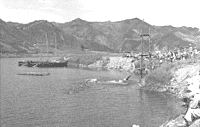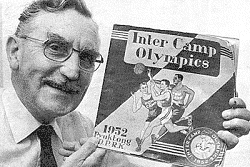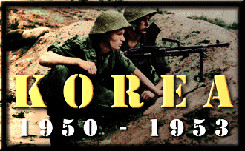Life in a Korean Prisoner of War Camp
Korean Veteran Ted Beckerley wrote about his horrific experiences of years in a prisoner of war camp in North Korea before his death. Ted, who came from Rushden died at the age of 78 on September 27, 1998 but he left behind him a detailed memoir of his time in captivity . The local branch of the British Korean Veterans' Association has turned this memoir into a booklet and a copy is being sent to the Imperial War Museum.
Here is an extract from the memoir which shows just how much many veterans suffered and how some, such as Charlie Adams from Wellingborough, were never to return home.
'Although ' the weather got better the food remained much the same. Now and again we had a real luxury of rice and once we had a small hard loaf of bread per man. The loaves were absolutely laced throughout with weevils, like caraway seeds, but they were dead and we were so hungry that we ate those loaves . Because our diet was so monotonous and lacking in vitamins some of our chaps suffered from 'Burning feet' a terrible burning sensation that made it almost impossible to put the feet on the ground. I believe it was a form of Beri Beri, which was the liquid swelling of limbs and body that some suffered.'
'To prevent this and hopefully to increase our supply of vitamins we began to boil and eat a non-flowering weed that was prolific in the camp. It was not unpleasant to eat - something like spinach. It was green and there was nothing else to eat. However, Charlie Adams and I both started to swell. Within a few days we were both like Michelin men when naked. When we lay down the fluid spread evenly and we just looked swollen with faces like a full moon. But when we stood up the change was dramatic. The fluid drained from our upper body and our faces became ordinary but the legs, feet, arms, and hands. The hands swelled and the fingers were like sausages...'

'Charlie just kept getting thinner. He had developed a nasty cough and occasionally coughed up blood. It looked pretty certain he had TB and the Beri Beri had been masking the symptoms. In peacetime, Charlie's job had been as a gardener at the local TB sanatorium and he had worked there for four years. Knowing Charlie, he had probably helped out in a lot of other ways in addition to his main duty. Charlie got worse and worse and was desperately thin. His face became that of a skeleton with huge staring eyes. He still prayed constantly and had such a longing to be home with his wife Hazel and their two children. Eventually the time came when he had to be taken to hospital early In July. Four of our chaps came with a stretcher and he was taken away. I had dysentery and was pretty weak so I was unable to be one of the four. who took him. I walked out with them as far as the gate (the hospital was outside the camp) and said goodbye. Charlie was still holding on to his prayer book. He died a few days later in the early hours of the morning. According to an American orderly who was with him Charlie cried out to Hazel just before he died. Her name was the last word he uttered.' Pictured left is the POW Camp No.5 Pyuktong on the Yala River North Korea.
In Memory of E.G. Beckerley P O W
Edward (Ted) Beckerley, a veteran of Dunkirk, Normandy and Korea, was one of a family of nine children, born in New Tredegar in South Wales in 1920. In 1938 when war seemed imminent, Ted, at the age of 18, applied to join the RAF as aircrew, similar to his elder brother, William, whom later was destined to be a prisoner of the Japanese for over 3 years. Unfortunately, Ted was had a slight speech impediment, for which he was rejected. In February 1939, he applied to join the Royal Tank Corps and after training was completed he was posted to a Scottish Territorial regiment, the Fife and Forfar Yeomanary.
His first experience of war was in 1940 with the British Expeditionary Force in France and Belgium and after his adventures, he escaped from the beaches near Dunkirk. After the 1944 Normandy landings, he returned to France and saw further action as a tank driver with the Churchill Crocodile flame-thrower tanks. Demobbed in 1946 he was only to have a short period of civilian life before he was recalled as a Reservist in 1950 for the Korean War, during which he was to see further action. He was taken prisoner by the Chinese during the January 1951 Happy Valley incident while supporting the Royal Ulster Rifles, when all the British Cromwell tanks were lost.

His captivity was to last for over 2 years until 1953 when he returned to the UK by air on compassionate grounds, his father being seriously ill. During the Olympic Games of 1988, Ted showed special interest in the Games in Seoul, for he had vivid memories dating back to 1952 when the Korean POWs staged their own. He remembered the excitement of the track events when the prisoners from the different camps in the Yalu River area were allowed to join forces for the competitions. He recalled that Britain won some gold but the majority went to the Americans because there were so many of them. At POW Camp No.5 Pyoktong on the Yalu River North Korea, Ted was not among the athletes competing, but he had a gift for writing and was responsible for entertainment after the Games in the evening. He produced plays and sketches and won first prize for drama. He also organised math classes for prisoners.
Returning to civilian life, he later retired as Head of Avionics at the Royal Aircraft Establishment at Thurleigh, near Bedford. He became an active member of the Wellingborough branch of the British Korean Veterans' Association, where he edited the branch newsletter. During this period he was visited at his home in Rushden, Northants, by Dr Conrad Wood of the Sound Recording Department of the Imperial War Museum, London, to tape his memories of World War Two and Korea. Ted passed away in 1998, at the age of 78.
Michael White - Wellingborough Branch of the BKVA
Many thanks to Felix Harrigan of British Korean Veterans Association for letting us publish the story of Ted Beckerley.



